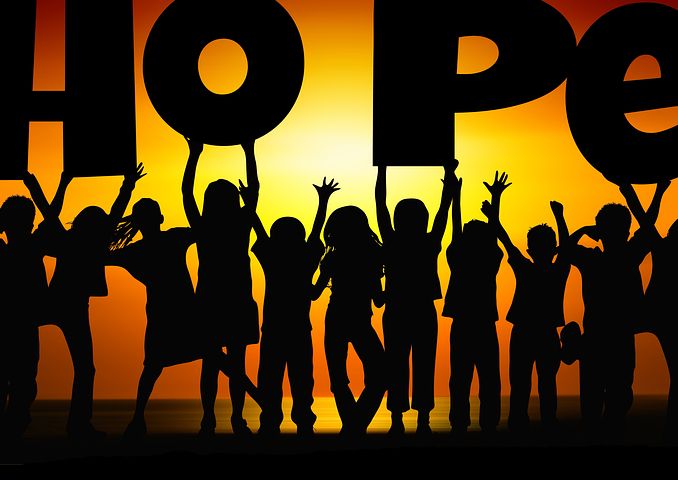Children – the triumph of hope over experience

What does a World Mental Health Day or a Child Mental Health Week mean for children who struggle in school, affected by the the push and pull of other people’s demands and the consequences of adverse experiences in their lives? Often they’re the ones who seem to ignore your helping hand, who shout and cry for attention, who hurt themselves or withdraw into their private worlds of painful memories.
And what does it mean for school staff who support and teach these children through the hardest times and on to to their better futures?
I think these public Days mean hope.
For children, by focusing on their mental health we’re getting to know more about what happens to them and what we can do to work together with them towards their better futures. The evidence to support us in breaking with tradition and building a new pathway ahead is growing; publicity concentrates attention on children’s needs and rights beyond the race for stickers and prizes.
For School staff, the combination of theory and practice is making sure children don’t get spun out of school, suffering another rejection, becoming detached from what may be their most trusted place which offers them safe haven from the storm of emotion, stress and confusion outside.
School staff are on the frontline for children’s mental health and wellbeing, as experts in their learning, growth and development. School staff work inside the flowing stream of reality of children’s lives, in the whole dazzling breadth of what children are and what they’re becoming, their strengths and needs, their hopes and dreams, what they offer and what they require. In framing the job of educators it’s vital to remember that schools operate in real time, in a model of moment-by-moment action. Keeping this in mind leads to practices embedded in this reality. Outside services have their role to play, operating on model of referral, diagnosis and intervention. Services provided inside school have their own educational character and this is what led me to the Solutions Focused approach to problem-solving, learning and growth
The core expertise of school staff in is education, not in biological or medical science or psychology, although the fields of biology, psychology, sociology and education do interact in the developing biopsychosocial-educational perspective. The idea that school staff should be trained up to act as mental illness triage service is misplaced, diagnosing and referring children out to high-level services such as the currently overstretched Child and Adolescent Mental Heath Service of the NHS.
I feel strengthened by news of OFSTED taking action to downgrade academy schools in England for illegally off-rolling students. We’ve known for years that this illegal use of exclusion has been happening it’s taken time for action to catch up with evidence. I join hands with parents, carers and their lawyers pushing back against the exclusion of children with additional needs and disabilities. Here in Wales, we have the Ace Aware national programme of education and action across services, taking the approach that; “A teacher has the most important job and can change the direction of a child’s life by simply being a trusted, caring adult willing to listen, show empathy and compassion.” Links are being drawn between the “last resort” of school exclusion and the coercion and modern slavery of children drawn into ‘county lines’ and along the pipeline to prison.
In North Wales, Scotland and London and the Met Police services are radically reframing drug abuse and violence as a public health rather than a criminal issue, ramping up supported inclusion in place of exclusion. In London, September 2018; “The Mayor, Sadiq Khan, has today announced plans to establish a new Violence Reduction Unit of specialists in health, police and local government to lead and deliver a long-term public health approach to tackling the causes of violent crime.”
And now across the UK we’re adding-in education, where most schools in all phases and of all types in the UK already don’t and won’t exclude children, steadily doing whatever it takes to include them instead.
All this in the face of a £10 million for tasers for street police as the new Home Secretary puts (what she seems to think is her new idea) into action that citizen’s should “literally feel terror”at the thought of breaking the law; an extra ten thousand new prison places and stop-and-search powers expanded, promised by Prime Minister Johnson in August this year, contrary to the advice of his own experts; £10 million to spread the Assertive Discipline arm of the Government’s “crack down” on behaviour, contrary to the accumulating flow of evidence.
So how can I possibly feel happy when it seems like we’re being pulled in two directions at once, with educators being the rope in an endless tug-of-war?
Because having been wading about in a muddy field for forty years, at last I feel firmer ground under my feet, the bedrock of evidence driving ethical, practical and financially smart action against exclusion and for inclusion. I feel a part of a combined drive towards maintaining inclusion, health and wellbeing, driving back zero-tolerance of needs and differences to bring more of the things that matter – achievement, mental health, happiness, social connection, agency and safety to name a but a few.
As an informed profession we can and are doing something different. My part in the slow drive is to bring Solutions Focused Coaching into schools, turning the kind idea of “ listen, show empathy and compassion” into practical action with structured kindness. Watch this space. Keep hopeful.


wow amazing such an informative article
Thanks for reading and commenting Carol. If you’re interested in going further with SF Coaching do get in touch again. Best wishes, Geoff